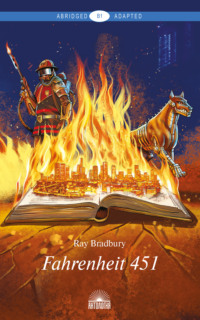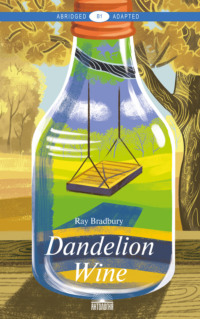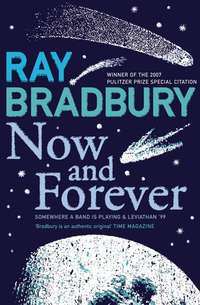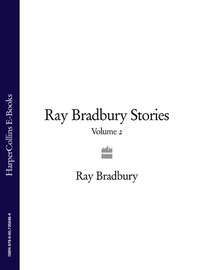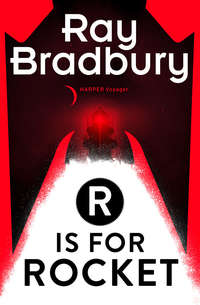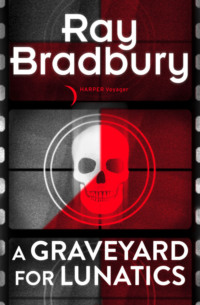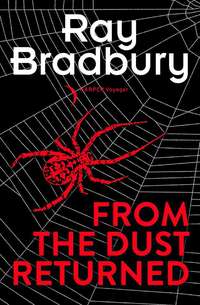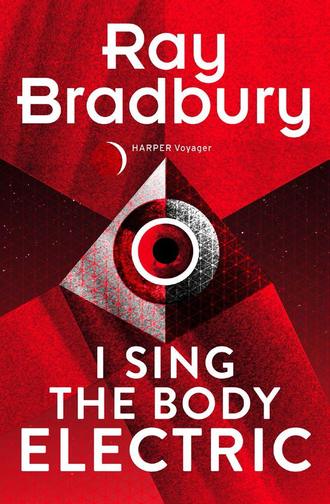
Полная версия
I Sing the Body Electric
“How did it go again?”
Dad took us around a long turn in the desert highway toward White Sands, and then he cleared his throat and cleared a space on the sky ahead as he drove and said, remembering:
“Rest in Peace. Prosperity Is Near.”
I let another mile go by before I said, “How much … unh. How much … an egg like that worth, Dad?”
“There’s no putting a human price on a thing like that,” he said, not looking back, just driving for the horizon, just going on. “Boy, you can’t set a price on an egg like that, laid by an inspired chicken at the Inspired Chicken Motel. Years from now, that’s what we’ll call it. The Inspired Chicken Motel.”
We drove on at an even forty miles an hour into the heat and dust of day-after-tomorrow.
My brother didn’t hit me, I didn’t hit my brother, carefully, secretly, until just before noon when we got out to water the flowers by the side of the road.
Downwind from Gellysburg
At eight thirty that night he heard the sharp crack from the theater down the hall.
Backfire, he thought. No. Gun.
A moment later he heard the great lift and drop of voices like an ocean surprised by a landfall which stopped it dead. A door banged. Feet ran.
An usher burst through his office door, glanced swiftly about as if blind, his face pale, his mouth trying words that would not come.
“Lincoln … Lincoln…”
Bayes glanced up from his desk.
“What about Lincoln?”
“He … he’s been shot.”
“Good joke. Now—”
“Shot. Don’t you understand? Shot. Really shot. For the second time, shot!”
The usher wandered out, holding to the wall.
Bayes felt himself rise. “Oh, for Christ—”
And he was running and passed the usher who, feeling him pass, began to run with him.
“No, no,” said Bayes. “It didn’t happen. It didn’t. It couldn’t. It didn’t, couldn’t…”
“Shot,” said the usher.
As they made the corridor turn, the theater doors exploded wide and a crowd that had turned mob shouted or yelled or screamed or stunned simply said, “Where is he?” “There!” “Is that him?” “Where?” “Who did it?” “He did? Him?” “Hold him!” “Watch out!” “Stop!”
Two security guards stumbled to view, pushed, pulled, twisted now this way and that, and between them a man who struggled to heave back from the bodies, the grasping hands and now the upflung and downfell fists. People snatched, pecked, pummeled, beat at him with packages or frail sun parasols which splintered like kites in a great storm. Women turned in dazed circles seeking lost friends, whimpering. Men, crying out, shoved them aside to squirm through to the center of the push and thrust and backward-pumping guards and the assaulted man who now masked his cut face with splayed fingers.
“Oh God, God.” Bayes froze, beginning to believe. He stared upon the scene. Then he sprang forward. “This way! Back inside! Clear off! Here! Here!”
And somehow the mob was breached, a door cracked wide to shove flesh through, then slammed.
Outside, the mob hammered, threatening damnations and scourges unheard of by living men. The whole theatre structure quaked with their muted wails, cries and estimates of doom.
Bayes stared a long moment at the shaken and twisted door-knobs, the chattering locks, then over to the guards and the man slumped between them.
Bayes leaped back suddenly, as if an even fresher truth had exploded there in the aisle.
Dimly, he felt his left shoe kick something which spun skittering like a rat chasing its tail along the carpeting under the seats. He bent to let his blind hand search, grope, find the still-half-warm pistol which, looked at but disbelieved, he shoved in his coat pocket as he backed down the aisle. It was a full half minute before he forced himself to turn and face the inevitable stage and that figure in the center of the stage.
Abraham Lincoln sat in his carved highback chair, his head bent forward at an unfamiliar angle. Eyes flexed wide, he gazed upon nothing. His large hands rested gently on the chair arms, as if he might momentarily shift weight, rise, and declare this sad emergency at an end.
Moving as under a tide of cold water, Bayes mounted the steps.
“Lights, dammit! Give us more lights!”
Somewhere, an unseen technician remembered what switches were for. A kind of dawn grew in the dim place.
Bayes, on the platform, circled the occupant of the chair, and stopped.
Yes. There it was. A neat bullet hole at the base of the skull, behind the left ear.
“Sic semper tyrannis,” a voice murmured somewhere.
Bayes jerked his head up.
The assassin, seated now in the last row of the theatre, face down but sensing Bayes’ preoccupation with Lincoln, spoke to the floor, to himself:
“Sic—”
He stopped. For there was an outraged stir above him. One security guard’s fist flew up, as if the man had nothing to do with it. The fist, urgent to itself, was on its way down to silence the killer when—
“Stop!” said Bayes.
The fist paused halfway, then withdrew to be nursed by the guard with mixtures of anger and frustration.
None, thought Bayes, I believe none of it. Not that man, not the guards and not … he turned to again see the bullet hole in the skull of the slain leader.
From the hole a slow trickle of machinery oil dripped.
From Mr. Lincoln’s mouth, a similar slow exudation of liquid moved down over the chin and whiskers to rain drop by drop upon his tie and shirt.
Bayes knelt and put his ear to the figure’s chest.
Faintly within there was the whine and hum of wheels, cogs, and circuitries still intact but malfunctioning.
For some reason this sound reared him to his feet in alarm.
“Phipps…!?”
The guards blinked with incomprehension.
Bayes snapped his fingers. “Is Phipps coming in tonight? Oh God, he mustn’t see this! Head him off! Tell him there’s an emergency, yes, emergency at the machine plant in Glendale! Move!”
One of the guards hurried out the door.
And watching him run, Bayes thought, please, God, keep Phipps home, keep him off…
Strange, at such a time, not your own life but the lives of others flashed by.
Remember … that day five years past when Phipps first slung his blueprints, his paintings, his watercolors out on a table and announced his Grand Plan? And how they had all stared at the plans and then up at him and gasped:
Lincoln?
Yes! Phipps had laughed like a father just come from a church where some sweet high vision in some strange Annunciation has promised him a most peculiar son.
Lincoln. That was the idea. Lincoln born again.
And Phipps? He would both engender and nurture this fabulous ever-ready giant robot child.
Wouldn’t it be fine … if they could stand in the meadow fields of Gettysburg, listen, learn, see, hone the edge of their razor souls, and live?
Bayes circled the slumped figure in the chair and, circling, numbered the days and remembered years.
Phipps, holding up a cocktail glass one night, like a lens that simultaneously proportions out the light of the past and the illumination of the future:
“I have always wanted to do a film on Gettysburg and the vast crowd there and far away out at the edge of that sun-drowsed impatient lost thick crowd, a farmer and his son trying so hard to hear, not hearing, trying to catch the wind-blown words from the tall speaker there on the distant stand, that gaunt man in the stovepipe hat who now takes off his hat, looks in it as to his soul rummaged there on scribbled letterbacks and begins to speak.
“And this farmer, in order to get his son up out of the crush, why, he hefts the boy up to sit upon his shoulders. There the boy, nine years old, a frail encumbrance, becomes ears to the man, for the man indeed cannot hear nor see but only guess what the President is speaking far across a sea of people there at Gettysburg and the President’s voice is high and drifts now clear, now gone, seized and dispersed by contesting breeze and wind. And there have been too many speakers before him and the crowd all crumpled wool and sweat, all mindless stockyard squirm and jostled elbow, and the farmer talks up to his son on his shoulders in a yearning whisper: What? What’s he say? And the boy, tilting his head, leaning his peach-fuzz ear to the wind, replies:
“‘Fourscore and seven years …’”
“Yes?”
“‘… ago, our fathers brought forth …’”
“Yes, yes!?”
“‘… on this continent …’”
“Eh?”
“Continent! ‘A new nation, conceived in liberty, and dedicated to the proposition that all men are…’
“And so it goes, the wind leaning against the frail words, the far man uttering, the farmer never tiring of his sweet burden of son and the son obedient cupping and catching and telling it all down in a fierce good whisper and the father hearing the broken bits and some parts missing and some whole but all fine somehow to the end…
“‘… of the people, by the people, for the people, shall not perish from the earth.’
“The boy stops whispering.
“It is done.
“And the crowd disperses to the four directions. And Gettysburg is history.
“And for a long time the father cannot bring himself to ease his translator of the wind down to set him on the earth, but the boy, changed, comes down at last…”
Bayes sat looking at Phipps.
Phipps slugged down his drink, suddenly chagrined at his own expansiveness, then snorted:
“I’ll never make that film. But I will make this!”
And that was the moment he pulled forth and unfolded the blueprints of the Phipps Eveready Salem, Illinois, and Springfield Ghost Machine, the Lincoln mechanical, the electro-oil-lubricated plastic India-rubber perfect-motioned and outspoken dream.
Phipps and his born-full-tall-at-birth Lincoln. Lincoln. Summoned live from the grave of technology, fathered by a romantic, drawn by need, slapped to life by small lightnings, given voice by an unknown actor, to be placed there to live forever in this far southwest corner of old-new America! Phipps and Lincoln.
And that was the day, yes, of the first wild bursts of laughter which Phipps ignored by simply saying, “We must, oh we must, stand all of us, downwind from Gettysburg. It’s the only hearing place.”
And he shared out his pride amongst them. This man he gave armatures, to that the splendid skull, another must trap the Ouija-spirit voice and sounding word, yet others must grow the precious skin, hair, and fingerprints. Yes, even Lincoln’s touch must be borrowed, copied, the same!
Derision then was their style of life.
Abe would never really speak, they all knew that, nor move. It would all be summed and written off with taxes as a loss.
But as the months lengthened into years, their outcries of hilarity turned to accepting smiles and stunned wild grins. They were a gang of boys caught up in some furtive but irritably joyous mortuary society who met midnights in marble vaults to disperse through graveyards at dawn.
The Lincoln Resurrection Brigade yeasted full and prospered. Instead of one mad fool, a dozen maniacs fell to rifling old mummy-dust news-files, begging and then pilfering death masks, burying and then digging up new plastic bones.
Some toured the Civil War battlefields in hopes that history, borne on some morning wind, might whip their coats like flags. Some prowled the October fields of Salem, starched brown with farewell summer, sniffing airs, pricking ears, alert for some lank lawyer’s unrecorded voice, anxious for echoes, pleading their case.
And none more anxious nor paternal-proud worrying than Phipps until the month when the robot was spread out on delivery tables, there to be ball and socketed, voice box locked in, rubber eyelids peeled back to sink therein the deep sad eyes which, gazing out, had seen too much. The generous ears were appended that might hear only time lost. The large-knuckled hands were hung like pendulums to guess that time. And then upon the tall man’s nakedness they shucked on suiting, buttoned buttons, fixed his tie, a gathering of tailors, no, Disciples now on a bright and glorious Easter mom and them on Jerusalem’s hills ready to roll aside the rock and stand Him forth at their cry.
And in the last hour of the last day Phipps had locked them all out as he finished the final touches on the recumbent flesh and spirit and at last opened the door and, not literally, no, but in some metaphoric sense, asked them to hoist him on their shoulders a last time.
And in silence watched as Phipps called across the old battlefield and beyond, saying the tomb was not his place; arise.
And Lincoln, deep in his cool Springfield marbled keep, turned in his slumbers and dreamed himself awake.
And rose up.
And spoke.
A phone rang.
Bayes jerked.
The memories fell away.
The theater phone on one far stage wall buzzed.
Oh, God, he thought, and ran to lift the phone.
“Bayes? This is Phipps. Buck just called and told me to get over there! Said something about Lincoln—”
“No,” said Bayes. “You know Buck. Must have called from the nearest bar. I’m here in the theater. Everything’s fine. One of the generator’s acted up. We just finished repairs—”
“He’s all right, then?”
“He’s great.” He could not take his eyes off the slumped body. Oh Christ. Oh God. Absurd.
“I—I’m coming over.”
“No, don’t!”
“Jesus, why are you shouting?”
Bayes bit his tongue, took a deep breath, shut his eyes so he could not see the thing in the chair and said, slowly:
“Phipps, I’m not shouting. There. The lights just came back on. I can’t keep the crowd waiting. I swear to you—”
“You’re lying.”
“Phipps!”
But Phipps had hung up.
Ten minutes, thought Bayes wildly, oh God, he’ll be here in ten minutes. Ten minutes before the man who brought Lincoln out of the grave meets the man who put him back in it…
He moved. A mad impulse made him wish to run backstage, start the tapes, see how much of the fallen creature would motivate, which limbs jerk, which lie numb—more madness. Time for that tomorrow.
There was only time now for the mystery.
And the mystery was enclosed in the man who sat in the third seat over in the last row back from the stage.
The assassin—he was an assassin, wasn’t he? The assassin, what did he look like?
He had seen his face, some few moments ago, hadn’t he? And wasn’t it a face from an old, a familiar, a faded and put-away daguerreotype? Was there a full mustache? Were there dark and arrogant eyes?
Slowly Bayes stepped down from the stage. Slowly he moved up the aisle and stopped, looking in at that man with his head bent into clutching fingers.
Bayes inhaled then slowly exhaled a question in two words:
“Mr.... Booth?”
The strange faraway man stiffened, then shuddered and let forth a terrible whisper:
“Yes…”
Bayes waited. Then he dared ask:
“Mr … John Wilkes Booth?”
To this the assassin laughed quietly. The laugh faded into a kind of dry croak.
“Norman Llewellyn Booth. Only the last name is … the same.”
Thank God, thought Bayes. I couldn’t have stood the other.
Bayes spun and paced up the aisle, stopped, and fixed his eyes to his watch. No time. Phipps was on the freeway now. Any moment, he’d be hammering at the door. Bayes spoke rigidly to the theater wall directly in front of him:
“Why?”
And it was an echo of the affrighted cry of three hundred people who had sat here not ten minutes ago and jumped to terror at the shot.
“Why!?”
“I don’t know!” cried Booth.
“Liar!” cried Bayes, in the same breath and instant.
“Too good a chance to miss.”
“What?” Bayes whirled.
“…nothing.”
“You don’t dare say that again!”
“Because,” said Booth, head down, half hid, now light, now dark, jerking into and out of emotions he only sensed as they came, went, rose, faded with barks of laughter and then silence. “Because … it’s the truth.” In awe, he whispered, stroking his cheeks. “I did it. I actually did it.”
“Bastard!”
Bayes had to keep walking up, around, down the aisles, circling, afraid to stop, afraid he might rush and strike and keep on striking this stupid genius, this bright killer—
Booth saw this and said:
“What are you waiting for? Get it over.”
“I will not—!” Bayes forced his yell down to a steady calmness. “I will not be tried for murder because I killed a man who killed another man who wasn’t really a man at all, but a machine. It’s enough to shoot a thing that seems alive. I won’t have some judge or jury trying to figure a law for a man who kills because a humanoid computer was shot. I won’t repeat your stupidity.”
“Pity,” mourned the man named Booth, and saying it, the light went out of his face.
“Talk,” said Bayes, gazing through the wall, imagining the night roads, Phipps in his car, and time running out. “You’ve got five minutes, maybe more, maybe less. Why did you do it, why? Start somewhere. Start with the fact you’re a coward.”
He waited. The security guard waited behind Booth, creaking uneasily in his shoes.
“Coward, yes.” said Booth. “How did you know?”
“I know.”
“Coward,” said Booth. “That’s me. Always afraid. You name it. Things. People. Places. Afraid. People I wanted to hit, but never hit. Things I always wanted, never had. Places I wanted to go, never went. Always wanted to be big, famous, why not? That didn’t work either. So, I thought, if you can’t find something to be glad about, find something to be sad. Lots of ways to enjoy being sad. Why? Who knows? I just had to find something awful to do and then cry about what I had done. That way you felt you had accomplished something. So, I set out to do something bad.”
“You’ve succeeded.”
Booth gazed down at his hands hung between his knees as if they held an old but suddenly remembered and simple weapon.
“Did you ever kill a turtle?”
“What?”
“When I was ten I found out about death. I found out that the turtle, that big dumb rocklike thing, was going to live long after I was dead. I figured if I had to go, the turtle went first. So I took a brick and hit him on the back until I broke his shell and he died…”
Bayes slowed in his constant pacing and said, “For the same reason, I once let a butterfly live.”
“No,” said Booth, quickly, then added, “no, not for the same reason. A butterfly lit on my hand once. The butterfly opened and shut its wings, just resting there. I knew I could crush it. But I didn’t because I knew that in ten minutes or an hour some bird would eat it. So I let it just fly away. But turtles?! They lie around backyards and live forever. So I went and got a brick and I was sorry for months after. Maybe I still am. Look…”
His hands trembled before him.
“And what,” said Bayes, “has all this to do with your being here tonight?”
“Do? What!” cried Booth, looking at Bayes as if he were mad. “Haven’t you been listening? Great God, I’m jealous! Jealous of anything that works right, anything that’s perfect, anything that’s beautiful all to itself, anything that lasts I don’t care what it is! Jealous!”
“You can’t be jealous of machines.”
“Why not, dammit?” Booth clutched the back of the seat in front of him and slowly pulled himself forward staring at the slumped figure in that highback chair in the center of the stage. “Aren’t machines more perfect, ninety-nine times out of a hundred than most people you’ve ever known? I mean really? Don’t they do things right? How many people can you name do things right one third, one half the time? That damned thing up there, that machine, not only looks perfection, but speaks and acts perfection. More, if you keep it oiled and wound and fixed it’ll be looking, speaking, acting right and grand and beautiful a hundred, two hundred years after I’m in the earth! Jealous? Damn right I am!”
“But a machine doesn’t know what it is.”
“I know, I feel!” said Booth. “I’m outside it looking in. I’m always outside things like that. I’ve never been in. The machine has it. I don’t. It was built to do one or two things exactly on the nose. No matter how much I learned or knew or tried the rest of my life, no matter what I did, I could never be as perfect, as fine, as maddening, as deserving of destruction as that thing up there, that man, that thing, that creature, that president…”
He was on his feet now, shouting at the stage eighty feet away.
Lincoln said nothing. Machinery oil gathered glistening on the floor under the chair.
“That president—” murmured Booth, as if he had come upon the real truth at last. “That president. Yes. Lincoln. Don’t you see? He died a long time ago. He can’t be alive. He just can’t be. It’s not right. A hundred years ago and yet here he is. He was shot once, buried once, yet here he is going on and on and on. Tomorrow and the day after that and all the days. So his name being Lincoln and mine Booth … I just had to come…”
His voice faded. His eyes had glazed over.
“Sit down,” said Bayes, quietly.
Booth sat, and Bayes nodded to the remaining security guard. “Wait outside, please.”
When the guard was gone and there was only Booth and himself and the quiet thing waiting up there in the chair, Bayes turned slowly at last and looked at the assassin. He weighed his words carefully and said:
“Good but not good enough.”
“What?”
“You haven’t given all the reasons why you came here tonight.”
“I have!”
“You just think you have. You’re kidding yourself. All Romantics do. One way or the other. Phipps when he invented this machine. You when you destroyed it. But it all comes down to this … very plain and very simple, you’d love to have your picture in the papers, wouldn’t you?”
Booth did not answer, but his shoulder straightened, imperceptibly.
“Like to be seen coast-to-coast on magazine covers?”
“No.”
“Get free time on TV?”
“No.”
“Be interviewed on radio?”
“No!”
“Like to have trials and lawyers arguing whether a man can be tried for proxy-murder…”
“No!”
“…that is, attacking, shooting a humanoid machine…”
“No!”
Booth was breathing fast now, his eyes moving wildly in his face. Bayes let more out:
“Great to have two hundred million people talking about you tomorrow morning, next week, next month, next year!”
Silence.
But a smile appeared, like the faintest drip of saliva, at the corner of Booth’s mouth. He must have felt it. He raised a hand to touch it away.
“Fine to sell your personal true real story to the international syndicates for a fine chunk?”
Sweat moved down Booth’s face and itched in his palms.
“Shall I give you the answer to all, all the questions I have just asked? Eh? Eh? Well,” said Bayes, “the answer is—”
Someone rapped on a far theater door.
Bayes jumped. Booth turned to stare.
The knock came, louder.
“Bayes, let me in, this is Phipps,” a voice cried outside in the night.
Hammering, pounding, then silence. In the silence, Booth and Bayes looked at each other like conspirators.
“Let me in, oh Christ, let me in!”
More hammering, then a pause and again the insistent onslaught, a crazy drum and tattoo, then silence again, the man outside panting, circling perhaps to find another door.
“Where was I?” said Bayes. “No. Yes. The answer to all those questions? Do you get worldwide TV radio film magazine newspaper gossip broadcast publicity…?”
A pause.
“No.”
Booth’s mouth jerked but he stayed silent.
“N,” Bayes spelled it, “O.”
He reached in, found Booth’s wallet, snapped out all the identity cards, pocketed them, and handed the empty wallet back to the assassin.


